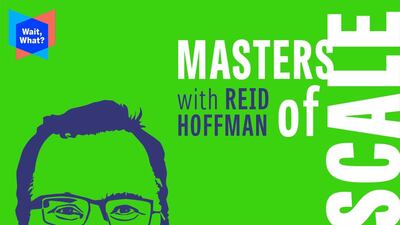If anyone should know how to scale a start-up “from zero to gazillion”, it’s Reid Hoffman, the co-founder of LinkedIn.
Now he shares his own theories and those of other big entrepreneurs such as Facebook’s Mark Zuckerberg in the podcast Masters of Scale.
The show has just finished its first season of 10 episodes, after launching in May. It is quirky: unlike most talking heads shows, this podcast intersperses original music and entertaining little sound clips - let’s call them the audio equivalents of animated gifs.
The first episode features the Airbnb co-founder and chief executive Brian Chesky and expounds on a Stanford class taught by Hoffman about “blitzscaling” - extremely rapid scaling. In subsequent podcasts he talks to Mr Zuckerberg about how to “move fast and break things” and how they run 10,000 versions of Facebook at any one time, to Netflix’s Reed Hastings on shaping the internet TV firm’s culture, and Google and Alphabet’s Eric Schmidt on how his pilot training taught him to make decisions quickly. Even Bill Gates makes a cameo appearance.
A simple hack given by the Facebook chief operating officer Sheryl Sandberg is to answer emails immediately with a “short, quick, incomplete answer” rather than a perfect one later. “Done is better than perfect,” she says.
_______________
Read more:
Book review: Marketing guru shares one-week formula to build ‘niche magnetic marketing systems’
Google back in the news feed game
Start-up generation rises in the UAE
_______________
Hoffman, 50, who was a founding board member and executive vice president of PayPal, went on to found LinkedIn in 2002 and is now a partner at the venture capital firm Greylock Partners. He was an early investor in companies such as Airbnb, Facebook and Zynga; Forbes puts his wealth at a very healthy US$3.1 billion.
He decided to start the podcast because “there aren’t many people who know how to scale effectively, and there are very few places where you can learn how to build great companies of great scale”. He says Silicon Valley’s success is down to its “scale-ups” rather than “start-ups” - where companies enjoy revenue in the billions and users in the tens of millions.
One of the most interesting episodes is late in the season, when Hoffman talks to Linda Rottenberg, the chief executive and co-founder of the non-profit Endeavor, which connects entrepreneurs to their nations’ elites. It has mentored more than 1,500 entrepreneurs, whose companies generated $10bn in revenues last year, and has a UAE base.
Hoffman talks to Ms Rottenberg about the next Silicon Valley - and why the Californian region has such a stranglehold on technology. After all, says Hoffman, half of the 13 high-tech companies in the world worth over $100bn are from the 50-mile stretch of Silicon Valley, despite the area’s three million people accounting for under 0.1 per cent of the world’s population.
Ms Rottenberg says that any region needs local role models and points to an early Endeavor example in Latin America. The non-profit’s first entrepreneur, a former sheep farmer called Wences Casares, had been turned down by 34 investors before being backed by Endeavor; 18 months later, he sold his Argentine online brokerage to Banco Santander for $750 million.
“All 34 called us within a week,” says Ms Rottenberg in the show, “and kids from all over Latin America started to say, ‘If Wences can do it, I can too.’” Today Mr Casares runs a bitcoin wallet start-up based in - you guessed it - Silicon Valley.
Hoffman says the reason Silicon Valley is so big is because it has become a talent hub - it’s as much about the coffee shop hang-outs and incubators as it is the headquarters of Facebook, Google and LinkedIn. When you take this broader definition as a “hub of entrepreneurial excellence”, the next Silicon Valley could be “just about anywhere”, he says.
To prove his point, Hoffman goes on to interview the Massachusetts Institute of Technology’s Joi Ito about how Boston has become a biotech hub and Andrew Ng, the former chief scientist of Chinese search company Baidu, about why China is already the next Silicon Valley, several times over - in Shenzhen, Beijing, Shanghai and Chengdu.
The podcast’s marketing boasts that each episode “unfolds like a detective story” as Hoffman tests an idea out on how to scale a business with one of today’s biggest (and mostly Silicon Valley) entrepreneurs. If you’re interested in tips from the world’s largest companies or are an entrepreneur, it’s worth spending a few hours listening to what Hoffman and his guests have to say.

